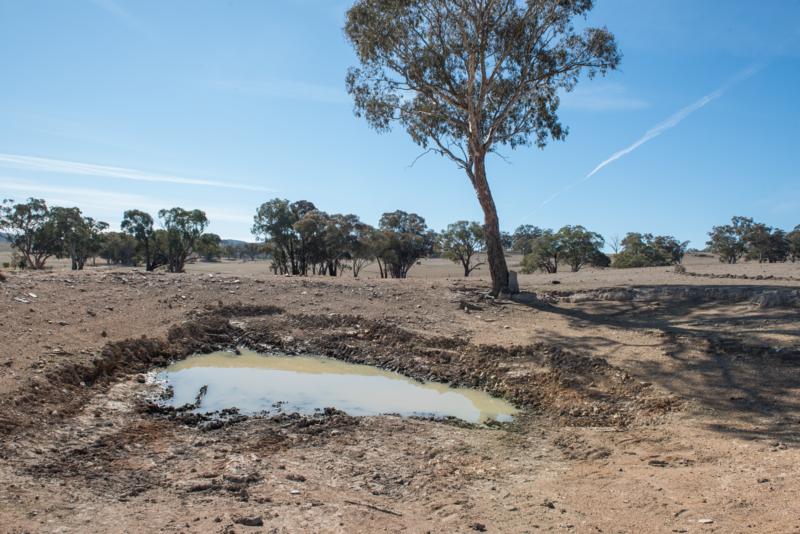John Ward has dedicated the last two decades to helping struggling farmers deal with the “old black dog”. John himself suffered a paralysing bout of depression in 1996, exacerbated by the “multiple stresses” related to farming life.
Back then he was a man of a few words when it came to discussing feelings. Long recovered from his depression after being treated with therapy and medication, John says blue moods in farmers are often triggered by the snowballing effect of drought, social isolation, financial hardship and strained personal relationships.
“Depression is a biochemical disease, often genetic, so sometimes there isn’t always a particularly stressful trigger. It just happens – which doesn’t make suffering for these people any less real either,” he says. “Add drought, no food on the table and being forced to shoot your stock to the mix, and it is a deadly combination for people who are already genetically vulnerable.”
BREAKING THE SHE’LL BE RIGHT MENTALITY
John, who runs a cattle and prune farm at Coleambally in the NSW Riverina, says a lot of men still don’t like to talk about how they feel. “There is still very much a ‘she’ll be right’ mentality in the country, or perhaps because they have to do so much alone, farmers think they can handle their emotional issues alone too.”
John, who is NSW Farmers’ spokesperson for the
R U OK? suicide prevention campaign, says farmers have significantly higher rates of suicide and depression than their urban counterparts – and the current drought is taking a bigger toll than ever before.
R U OK? Day is held nationwide on 13th September. Visit their website for more information.
“Farmers need to recognise and act on the symptoms in themselves and in others,” he says. “Much of this could be prevented if people were able to better access psychological,
telepsychiatry [mental health services delivered via technology such as video conferencing], medication and support.
“But sometimes we just need practical solutions, too. Farmers don’t want hand-outs or interest-free loans. They want freight subsidies and feed assistance. Many of us are paying $25,000 a month to feed our cattle.”
*READ the story of Central West sheep farmers Wayne and Lynette Culverson who are undoubtedly in drought and feeding each day but remain positive: “We’ll get through it”.
 Drought-stricken land at Dohnedale, near Orange in the Central Tablelands from our July feature: “We’ll get through it”.
Drought-stricken land at Dohnedale, near Orange in the Central Tablelands from our July feature: “We’ll get through it”.
ACCESS TO MENTAL HEALTH SERVICES CRITICAL FOR RURAL COMMUNITIES
Mental health reform expert Professor Ian Hickie, co-director of the Brain and Mind Centre at the University of Sydney, says governments have tried “for decades” to get centralised mental health services to the country – to no avail.
He says technology such as video conferencing is largely the answer, saving patients from having to drive hundreds of kilometres to access quality healthcare.
“Farmers are totally on board with technology,” Professor Hickie says. “But a lot of the problem is they can’t access it, or the wi-fi is not reliable or affordable.
*READ more about regional connectivity and the challenges of living in a black spot.
SMART TECHNOLOGY AS A SOLUTION TO ISOLATION
“In years to come I hope we are triaging rural depression via smart technology so we can immediately respond with quality mental health services for people who need it most, when they need it most. They wouldn’t have to travel miles, only to find someone who wasn’t adequately qualified.
“The other issue is the loss of ‘thriving communities’. Rural communities are getting smaller and smaller and people are becoming more isolated. This again is where people can be joined up by technology. Communities need to be able to access schools, libraries, hospitals, community health centres and towns for wi-fi out of office hours.”
MENTAL HEALTH FACTS
50%
higher rate of suicide outside of Australia’s capital cities.
$52.42
Medicare expenditure on mental health per person in cities.
$8.26
Medicare expenditure on mental health per person in very remote areas.
DEPRESSION – DO YOU KNOW THE SIGNS?
- Change in sleep patterns (insomnia or oversleeping)
- Changes in appetite or weight
- Anger, irritability and anxiety
- Loss of interest in things you love
- Reduced pain tolerance (neck or back pain is common in depression)
- Feelings of worthlessness, guilt
- Alcohol and drug abuse
- Reduced interest in sex
- Compulsive behaviour; addiction to gambling, social media or excessive spending
- Poor concentration and memory
Source: Professor Ian Hickie
If you suspect you are suffering from depression, see your GP or health professional. If a life is in danger, phone 000.
Free rural mental health support services
Lifeline Australia: 13 11 14
NSW Mental Health Line: 1800 011 511
Kids Helpline: 1800 55 1800
MensLine Australia: 1300 789 978
Mate Helping Mate: facebook.com/matehelpingmate
(a self-help program for men in rural Australia)
Suicide Call Back Service: 1300 659 467
Beyondblue: 1300 22 4636
Aussie Helpers Virtual Psychologist: virtualpsychologist.com.au
(counselling services by SMS, phone, email or chat)
Rural Adversity Mental Health Program: ramhp.com.au
(contacts and links to mental health services)